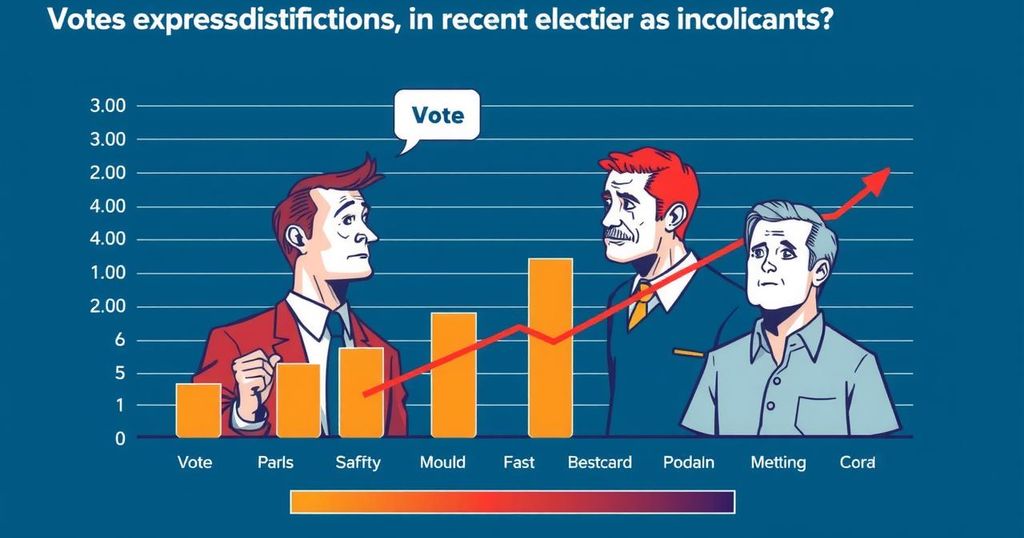The “super year” for global elections in 2024 has seen a surge of anti-incumbent sentiment, leading to unprecedented electoral changes. Discontent among voters is primarily driven by economic dissatisfaction, with many incumbents facing significant defeats. Political analysts note a growing sense of frustration towards political elites, suggesting a shift away from traditional ideological divides and towards a demand for accountability and change.
The global elections of 2024 have revealed a significant trend of discontent directed towards incumbent governments, with voters showing an unprecedented willingness to remove sitting officials from power. This year, often referred to as the “super year” for elections, has seen major electoral changes across numerous nations, leading to a dramatic shift in governance. Issues such as economic dissatisfaction, inflation, and public health crises stemming from the COVID-19 pandemic have played crucial roles in shaping this electoral backlash. Politicians across various political spectrums, from the right to the left, have faced severe consequences, illustrating a widespread sentiment of frustration among the electorate. Prominent incumbent defeats include Donald Trump’s recent victory over Vice President Kamala Harris, following President Joe Biden’s unexpected withdrawal. In the United Kingdom, the Conservative Party faced its worst election results since 1832, while far-right parties gained ground in France and Germany. Furthermore, the electoral landscape in Asia reflected similar results, with significant losses for traditional ruling parties in South Korea and India, signaling a global trend of voters dissatisfied with the status quo. Political scientists, like Richard Wike, note the growing perception among voters that their governments are disconnected from everyday realities, which has contributed to a decline in the appeal of democratic institutions. Furthermore, high inflation rates and economic stress have emerged as critical factors influencing voter behavior, leading to what some experts describe as an “electoral long COVID.” In Africa, the ruling African National Congress in South Africa suffered a substantial loss, highlighting the sentiment of discontent shared across various continents. However, Mexico stands out as a notable exception to the trend, where economic contentment appears to have buffered the incumbent party from voter backlash. As new leaders take office, many of them quickly face skepticism and disappointment from the electorate seeking immediate improvements in their socioeconomic conditions. Ultimately, the results of the 2024 elections could signify a fundamental shift in political dynamics worldwide, characterized by an increasing demand for accountability from governments and a potential re-evaluation of incumbent authority. The observed phenomena may indicate a shift away from traditional analysis centered on ideological divides towards a more profound anti-incumbent sentiment that transcends partisan lines. In conclusion, the outcomes of the 2024 elections underscore an essential narrative of voter frustration and demand for change, with incumbent parties facing considerable challenges due to heightened expectations from the populace. As political experts contemplate the implications of these developments, the essence of their findings points toward a potentially seismic shift in global governance and voter engagement.
The 2024 elections represent a significant moment in global politics, highlighting a growing trend of voter dissatisfaction with incumbent authorities. Across multiple countries, voters are increasingly rejecting sitting governments, regardless of political affiliation. This shift appears to be driven by various factors, prominently including economic challenges, high inflation rates, and a lingering sense of disenchantment following the COVID-19 pandemic. The burgeoning anti-incumbent sentiment calls into question the foundations of political stability and democratic governance as electorates demand more accountability from their leaders.
The 2024 electoral landscape marks a pivotal moment, characterized by widespread anti-incumbent sentiment fueled by economic distress and dissatisfaction with incumbent authorities. Voter discontent spans the globe, influencing electoral outcomes across diverse political systems. Governments that fail to address these concerns face growing challenges, as public scrutiny intensifies and expectations rise. As political observers analyze the shifts in governance, it becomes increasingly clear that the electorate is shifting toward a more proactive demand for accountability from their leaders.
Original Source: apnews.com






